203 books about Indigenous Studies and 7
start with T
203 books about Indigenous Studies and 7
203 books about Indigenous Studies
7 start with T start with T
7 start with T start with T
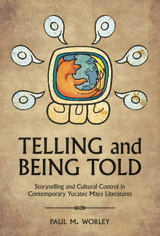
Telling and Being Told
Storytelling and Cultural Control in Contemporary Yucatec Maya Literatures
Paul M. Worley
University of Arizona Press, 2013
Through performance and the spoken word, Yucatec Maya storytellers have maintained the vitality of their literary traditions for more than five hundred years. Telling and Being Told presents the figure of the storyteller as a symbol of indigenous cultural control in contemporary Yucatec Maya literatures. Analyzing the storyteller as the embodiment of indigenous knowledge in written and oral texts, this book highlights how Yucatec Maya literatures play a vital role in imaginings of Maya culture and its relationships with Mexican and global cultures.
Through performance, storytellers place the past in dynamic relationship with the present, each continually evolving as it is reevaluated and reinterpreted. Yet non-indigenous actors often manipulate the storyteller in their firsthand accounts of the indigenous world. Moreover, by limiting the field of literary study to written texts, Worley argues, critics frequently ignore an important component of Latin America’s history of conquest and colonization: The fact that Europeans consciously set out to destroy indigenous writing systems, making orality a key means of indigenous resistance and cultural continuity.
Given these historical factors, outsiders must approach Yucatec Maya and other indigenous literatures on their own terms rather than applying Western models. Although oral literature has been excluded from many literary studies, Worley persuasively demonstrates that it must be included in contemporary analyses of indigenous literatures as oral texts form a key component of contemporary indigenous literatures, and storytellers and storytelling remain vibrant cultural forces in both Yucatec communities and contemporary Yucatec writing.
Through performance, storytellers place the past in dynamic relationship with the present, each continually evolving as it is reevaluated and reinterpreted. Yet non-indigenous actors often manipulate the storyteller in their firsthand accounts of the indigenous world. Moreover, by limiting the field of literary study to written texts, Worley argues, critics frequently ignore an important component of Latin America’s history of conquest and colonization: The fact that Europeans consciously set out to destroy indigenous writing systems, making orality a key means of indigenous resistance and cultural continuity.
Given these historical factors, outsiders must approach Yucatec Maya and other indigenous literatures on their own terms rather than applying Western models. Although oral literature has been excluded from many literary studies, Worley persuasively demonstrates that it must be included in contemporary analyses of indigenous literatures as oral texts form a key component of contemporary indigenous literatures, and storytellers and storytelling remain vibrant cultural forces in both Yucatec communities and contemporary Yucatec writing.
[more]
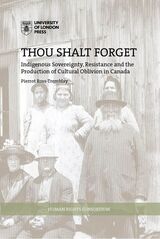
Thou Shalt Forget
Indigenous sovereignty, resistance and the production of cultural oblivion in Canada
Pierrot Ross-Tremblay
University of London Press, 2019
What is ‘cultural oblivion’ and ‘psychological colonialism’, and how are they affecting the capacity of Indigenous Peoples in Canada to actively resist systematic and territorial oppression by the state? Following a decade-long research project, this new book by Pierrot Ross-Tremblay examines the production of oblivion among his own community, the Essipiunnuat [or, ‘People of the Brook Shells River’] and the relationship between a colonial imperative to forget. The book illustrates how the ‘cultural oblivion’ of vulnerable minority communities is a critical human rights issue but also asks us to reflect upon both the role of the state and the local elite in creating and warping our perception and understanding of history.
[more]
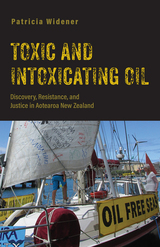
Toxic and Intoxicating Oil
Discovery, Resistance, and Justice in Aotearoa New Zealand
Patricia Widener
Rutgers University Press, 2021
When oil and gas exploration was expanding across Aotearoa New Zealand, Patricia Widener was there interviewing affected residents and environmental and climate activists, and attending community meetings and anti-drilling rallies. Exploration was occurring on an unprecedented scale when oil disasters dwelled in recent memory, socioecological worries were high, campaigns for climate action were becoming global, and transitioning toward a low carbon society seemed possible. Yet unlike other communities who have experienced either an oil spill, or hydraulic fracturing, or offshore exploration, or climate fears, or disputes over unresolved Indigenous claims, New Zealanders were facing each one almost simultaneously. Collectively, these grievances created the foundation for an organized civil society to construct and then magnify a comprehensive critical oil narrative--in dialogue, practice, and aspiration. Community advocates and socioecological activists mobilized for their health and well-being, for their neighborhoods and beaches, for Planet Earth and Planet Ocean, and for terrestrial and aquatic species and ecosystems. They rallied against toxic, climate-altering pollution; the extraction of fossil fuels; a myriad of historic and contemporary inequities; and for local, just, and sustainable communities, ecologies, economies, and/or energy sources. In this allied ethnography, quotes are used extensively to convey the tenor of some of the country’s most passionate and committed people. By analyzing the intersections of a social movement and the political economy of oil, Widener reveals a nuanced story of oil resistance and promotion at a time when many anti-drilling activists believed themselves to be on the front lines of the industry’s inevitable decline.
[more]
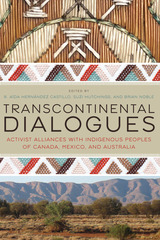
Transcontinental Dialogues
Activist Alliances with Indigenous Peoples of Canada, Mexico, and Australia
Edited by R. Aída Hernández Castillo, Suzi Hutchings, and Brian Noble
University of Arizona Press, 2019
Transcontinental Dialogues brings together Indigenous and non-Indigenous anthropologists from Mexico, Canada, and Australia who work at the intersections of Indigenous rights, advocacy, and action research. These engaged anthropologists explore how obligations manifest in differently situated alliances, how they respond to such obligations, and the consequences for anthropological practice and action.
This volume presents a set of pieces that do not take the usual political or geographic paradigms as their starting point; instead, the particular dialogues from the margins presented in this book arise from a rejection of the geographic hierarchization of knowledge in which the Global South continues to be the space for fieldwork while the Global North is the place for its systematization and theorization. Instead, contributors in Transcontinental Dialogues delve into the interactions between anthropologists and the people they work with in Canada, Australia, and Mexico. This framework allows the contributors to explore the often unintended but sometimes devastating impacts of government policies (such as land rights legislation or justice initiatives for women) on Indigenous people’s lives.
Each chapter’s author reflects critically on their own work as activist-scholars. They offer examples of the efforts and challenges that anthropologists—Indigenous and non-Indigenous—confront when producing knowledge in alliances with Indigenous peoples. Mi’kmaq land rights, pan-Maya social movements, and Aboriginal title claims in rural and urban areas are just some of the cases that provide useful ground for reflection on and critique of challenges and opportunities for scholars, policy-makers, activists, allies, and community members.
This volume is timely and innovative for using the disparate anthropological traditions of three regions to explore how the interactions between anthropologists and Indigenous peoples in supporting Indigenous activism have the potential to transform the production of knowledge within the historical colonial traditions of anthropology.
This volume presents a set of pieces that do not take the usual political or geographic paradigms as their starting point; instead, the particular dialogues from the margins presented in this book arise from a rejection of the geographic hierarchization of knowledge in which the Global South continues to be the space for fieldwork while the Global North is the place for its systematization and theorization. Instead, contributors in Transcontinental Dialogues delve into the interactions between anthropologists and the people they work with in Canada, Australia, and Mexico. This framework allows the contributors to explore the often unintended but sometimes devastating impacts of government policies (such as land rights legislation or justice initiatives for women) on Indigenous people’s lives.
Each chapter’s author reflects critically on their own work as activist-scholars. They offer examples of the efforts and challenges that anthropologists—Indigenous and non-Indigenous—confront when producing knowledge in alliances with Indigenous peoples. Mi’kmaq land rights, pan-Maya social movements, and Aboriginal title claims in rural and urban areas are just some of the cases that provide useful ground for reflection on and critique of challenges and opportunities for scholars, policy-makers, activists, allies, and community members.
This volume is timely and innovative for using the disparate anthropological traditions of three regions to explore how the interactions between anthropologists and Indigenous peoples in supporting Indigenous activism have the potential to transform the production of knowledge within the historical colonial traditions of anthropology.
[more]
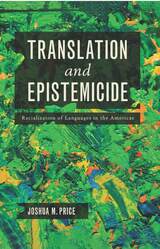
Translation and Epistemicide
Racialization of Languages in the Americas
Joshua M. Price
University of Arizona Press, 2023
Translation has facilitated colonialism from the fifteenth century to the present day. Epistemicide, which involves destroying, marginalizing, or banishing Indigenous, subaltern, and counter-hegemonic knowledges, is one result. In the Americas, it is a racializing process. But in the hands of subaltern translators and interpreters, translation has also been used as a decolonial method.
The book gives an account of translation-as-epistemicide in the Americas, drawing on a range of examples from the early colonial period to the War on Terror. The first chapters demonstrate four distinct operations of epistemicide: the commensuration of worlds, the epistemic marginalization of subaltern translators and the knowledge they produce, the criminalization of translators and interpreters, and translation as piracy or extractivism. The second part of the book outlines decolonial translation strategies, including an epistemic posture the author calls “bewilderment.”
Translation and Epistemicide tracks how through the centuries translation practices have enabled colonialism and resulted in epistemicide, or the destruction of Indigenous and subaltern knowledge.
The book gives an account of translation-as-epistemicide in the Americas, drawing on a range of examples from the early colonial period to the War on Terror. The first chapters demonstrate four distinct operations of epistemicide: the commensuration of worlds, the epistemic marginalization of subaltern translators and the knowledge they produce, the criminalization of translators and interpreters, and translation as piracy or extractivism. The second part of the book outlines decolonial translation strategies, including an epistemic posture the author calls “bewilderment.”
Translation and Epistemicide tracks how through the centuries translation practices have enabled colonialism and resulted in epistemicide, or the destruction of Indigenous and subaltern knowledge.
[more]
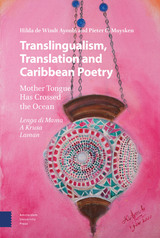
Translingualism, Translation and Caribbean Poetry
Mother Tongue Has Crossed the Ocean
Hilda de Windt Ayoubi
Amsterdam University Press, 2022
Linguists estimate that there are around 7,000 languages in the world, but many are under threat. Translingualism, Translation and Caribbean Poetry is a multi-language poetry collection comprising over fifty translations of Curaçao poet Hilda de Windt Ayoubi’s ‘Lenga di mama’ (‘Mother Tongue’), alongside three additional poems each providing a different perspective on the mother tongue. De Windt Ayoubi’s sharp and socially charged poetry has inspired translations from across the world; collected here for the first time, they serve to protect the native languages and cultures – particularly the minority languages – of their translators, who range from expert linguists to speakers of underrepresented languages. In his accompanying essay, Pieter Muysken considers the role of translation in addressing this urgent cultural concern, discussing language loss and revitalization, bilingual translations and mass translations. Complete with maps, language profiles, and the poet’s personal interviews, this collection explores the emotional, cultural and intellectual importance of language conservation through poetry.
[more]

Transmedia Geographies
Decoloniality, Democratization, Cultural Citizenship, and Media Convergence
Kevin Glynn
Rutgers University Press, 2025
Looking at the US, New Zealand, and Central America, this book considers how cultural politics has been deeply reworked in our contemporary media environment. The authors analyze how rampant technological convergence has allowed stories to spill across media platforms as well as geographical borders, and how those stories re-emerge as transmediated events.
The authors explore the cultural politics that have developed within this new media environment by moving across the mediated landscapes of the first, third and fourth (Indigenous people’s) worlds, which are deeply intertwined and interconnected under contemporary conditions of neoliberal globalization and emergent regimes of authoritarian post-democracy. The book attends both to the platforms and digital networks of the new media environment and to the cultural forms and practices that have constituted television as the dominant medium of communication throughout the second half of the twentieth century. In the new media environment, transmediation works on behalf not only of those corporate mega-conglomerates that have become all too familiar to media consumers around the world, but also for many communities that have previously been excluded from access to the means of electronic textual production and circulation. For the latter, grassroots transmediation has become an important technique for the production of cultural citizenship.
The authors explore the cultural politics that have developed within this new media environment by moving across the mediated landscapes of the first, third and fourth (Indigenous people’s) worlds, which are deeply intertwined and interconnected under contemporary conditions of neoliberal globalization and emergent regimes of authoritarian post-democracy. The book attends both to the platforms and digital networks of the new media environment and to the cultural forms and practices that have constituted television as the dominant medium of communication throughout the second half of the twentieth century. In the new media environment, transmediation works on behalf not only of those corporate mega-conglomerates that have become all too familiar to media consumers around the world, but also for many communities that have previously been excluded from access to the means of electronic textual production and circulation. For the latter, grassroots transmediation has become an important technique for the production of cultural citizenship.
[more]
READERS
Browse our collection.
PUBLISHERS
See BiblioVault's publisher services.
STUDENT SERVICES
Files for college accessibility offices.
UChicago Accessibility Resources
home | accessibility | search | about | contact us
BiblioVault ® 2001 - 2024
The University of Chicago Press









